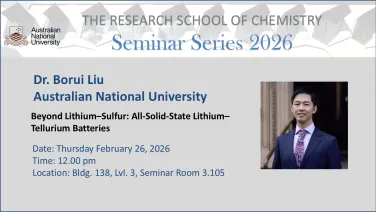RSC School Seminar - Dr Carol Hua (The University of Melbourne)
Title: Chiral Chemical Sensors and Stimuli Responsive Materials
Speakers
Event series
Content navigation
Description

Chiral Chemical Sensors and Stimuli Responsive Materials
Abstract
The development of real-time, highly sensitive chemical sensors for the detection of biologically and environmentally relevant analytes is of great interest given their wide applicability to healthcare and environmental monitoring. Our group is currently developing fluorescent chiral chemical sensors for the detection of biological analytes, where the presence of different enantiomeric ratios can provide early indications of disease. The application of luminescent, stimuli-responsive materials as chemical sensors for analytes of relevance for the environment may provide a powerful strategy to enhance the sensitivity and accuracy of sensors particularly in complex sample matrices.
Metal-Organic Frameworks (MOFs) are crystalline materials containing inorganic nodes bridged by linkers. The high tunability of MOFs enable the systematic modification of pore chemistry and size. Tailored pore environments can be designed, making these materials well-suited to act as chemical sensors and stimuli responsive materials. This presentation will detail our latest results in the design of chiral chemical sensors and stimuli responsive materials. The chiral sensing properties of two BINOL-based Zn MOF systems will be highlighted, with varying degrees of fluorescence quenching. The mechanism of fluorescence quenching and guest position within the framework as elucidated through time resolved fluorescence and computational calculations will be discussed. The switchable and chemical sensing properties of an isostructural series of lanthanoid MOFs containing a redox-active viologen ligand will also be presented. The reversible one electron reduction of the viologen from its dication to its radical cation state upon exposure to a light stimulus are elucidated from photoirradiation experiments on the MX1 beamline at the Australian Synchrotron.
Short bio
Dr Carol Hua is currently a Senior Lecturer in the School of Chemistry. Carol received her BSc(Hons) from the University of New South Wales (2011) and her PhD from the University of Sydney (2016) for which she was awarded the 2016 RACI Cornforth Medal for an outstanding PhD thesis in chemistry. She undertook postdoctoral researcher positions at the University of Limerick, Ireland and Northwestern University, USA supported by the Endeavour and American-Australian Fellowships. In 2018, Carol moved back to Australia to start her independent research career as a McKenzie Fellow at the University of Melbourne before becoming a Lecturer at Deakin University in 2021. Carol returned to the University of Melbourne in February 2023 in a continuing position as a Senior Lecturer.
Location
Building 136, Lvl 3, STB S1

